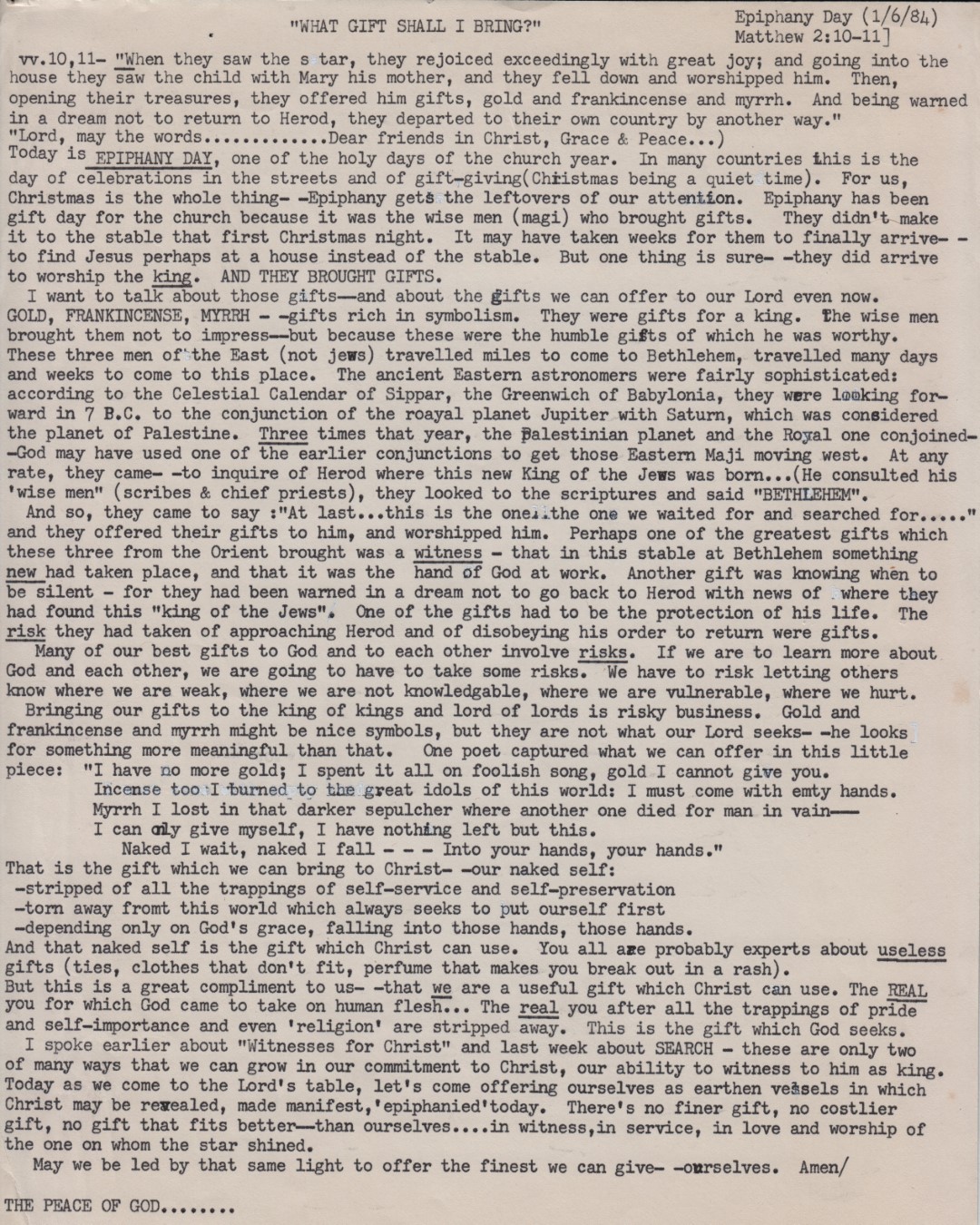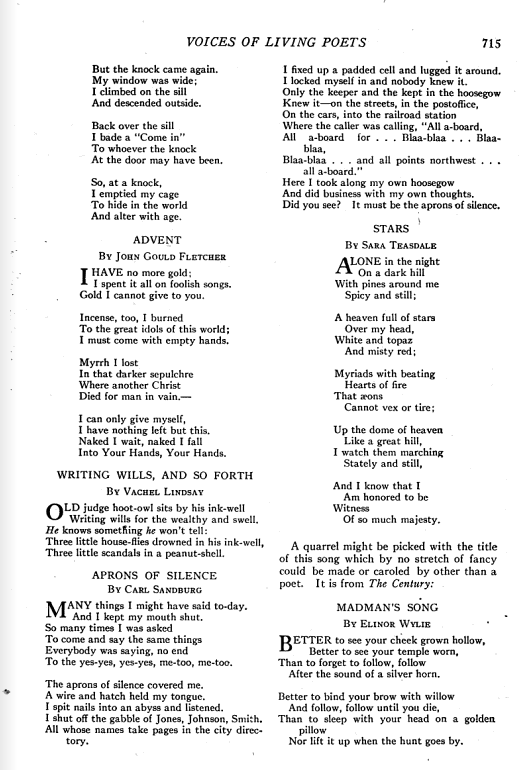Here is a typed Epiphany sermon from 1984. Because the typed text is pretty clear, I have used Google OCR to transcribe the sermon text, and it is included below the scanned image.
The Gospel text is from Matthew, making this part of Epiphany in Year A in the Revised Common Lectionary.
There is a poem in second half of the sermon, and I’m pretty surethat the poem is “Advent” by poet John Gould Fletcher. He included this poem in a Epiphany sermon in 1974, as well. I found an old printing of the poem in an old book from 1920 on Google Books, so I’m going to include that page below.
What Gift Shall I Bring? - Epiphany - 1/6/1984

“WHAT GIFT SHALL I BRING?”
Epiphany Day (1/6/84) Matthew 2:10-11
vv.10,11- “When they saw the star, they rejoiced exceedingly with great joy; and going into the house they saw the child with Mary his mother, and they fell down and worshiped him. Then, opening their treasures, they offered him gifts, gold and frankincense and myrrh. And being warned in a dream not to return to Herod, they departed to their own country by another way.”
“Lord, may the words…… Dear friends in Christ, Grace & Peace…)
Today is EPIPHANY DAY, one of the holy days of the church year. In many countries this is the day of celebrations in the streets and of gift-giving (Christmas being a quiet time). For us, Christmas is the whole thing- -Epiphany gets the leftovers of our attention.
Epiphany has been gift day for the church because it was the wise men (magi) who brought gifts. They didn’t make it to the stable that first Christmas night. It may have taken weeks for them to finally arrive- to find Jesus perhaps at a house instead of the stable. But one thing is sure–they did arrive to worship the king. AND THEY BROUGHT GIFTS.
I want to talk about those gifts-and about the gifts we can offer to our Lord even now. GOLD, FRANKINCENSE, MYRRH –gifts rich in symbolism. They were gifts for a king. The wise men brought them not to impress–but because these were the humble gifts of which he was worthy. These three men of the East (not jews) traveled miles to come to Bethlehem, traveled many days and weeks to come to this place. The ancient Eastern astronomers were fairly sophisticated: according to the Celestial Calendar of Sippar, the Greenwich of Babylonia, they were looking forward in 7 B.C. to the conjunction of the royal planet Jupiter with Saturn, which was considered the planet of Palestine. Three times that year, the Palestinian planet and the Royal one conjoined- -God may have used one of the earlier conjunctions to get those Eastern Maji moving west. At any rate, they came–to inquire of Herod where this new King of the Jews was born…(He consulted his ‘wise men” (scribes & chief priests), they looked to the scriptures and said “BETHLEHEM”.
And so, they came to say “At last…this is the one the one we waited for and searched for…..” and they offered their gifts to him, and worshipped him. Perhaps one of the greatest gifts which these three from the Orient brought was a witness that in this stable at Bethlehem something new had taken place, and that it was the hand of God at work. Another gift was knowing when to be silent for they had been warned in a dream not to go back to Herod with news of where they had found this “king of the Jews”. One of the gifts had to be the protection of his life. The risk they had taken of approaching Herod and of disobeying his order to return were gifts.
Many of our best gifts to God and to each other involve risks. If we are to learn more about God and each other, we are going to have to take some risks. We have to risk letting others know where we are weak, where we are not knowledgeable, where we are vulnerable, where we hurt.
Bringing our gifts to the king of kings and lord of lords is risky business. Gold and frankincense and myrrh might be nice symbols, but they are not what our Lord seeks–he looks for something more meaningful than that.
One poet captured what we can offer in this little piece:
I have no more gold; I spent it all on foolish song, gold I cannot give you.
Incense too I burned to the great idols of this world: I must come with empty hands.
Myrrh I lost in that darker sepulcher where another one died for man in vain–
I can only give myself, I have nothing left but this.
Naked I wait, naked I fall Into your hands, your hands.
That is the gift which we can bring to Christ
- our naked self:
- stripped of all the trappings of self-service and self-preservation
- torn away fromt this world which always seeks to put ourself first
- depending only on God’s grace, falling into those hands, those hands.
And that naked self is the gift which Christ can use. You all are probably experts about useless gifts (ties, clothes that don’t fit, perfume that makes you break out in a rash).
But this is a great compliment to us–that we are a useful gift which Christ can use. The REAL you for which God came to take on human flesh… The real you after all the trappings of pride and self-importance and even ‘religion’ are stripped away. This is the gift which God seeks.
I spoke earlier about “Witnesses for Christ” and last week about SEARCH - these are only two of many ways that we can grow in our commitment to Christ, our ability to witness to him as king. Today as we come to the Lord’s table, let’s come offering ourselves as earthen vessels in which Christ may be revealed, made manifest, ’epiphanied’ today. There’s no finer gift, no costlier gift, no gift that fits better than ourselves….in witness, in service, in love and worship of the one on whom the star shined.
May we be led by that same light to offer the finest we can give ourselves.
THE PEACE OF GOD….
Amen
Advent - John Gould Fletcher
